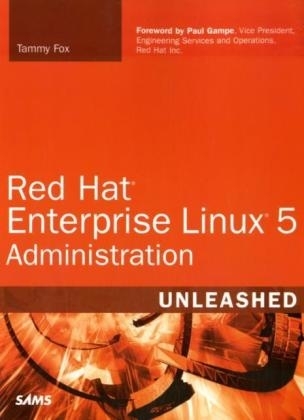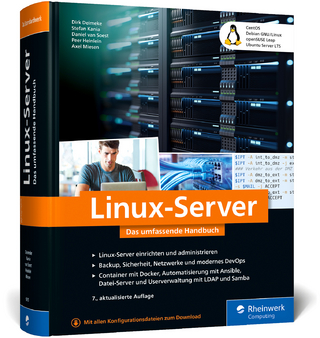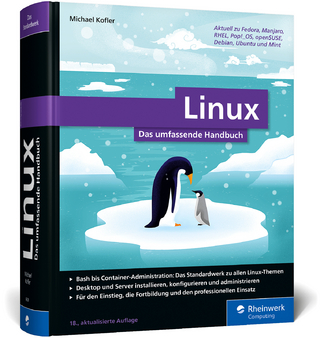
Red Hat Enterprise Linux 5 Administration Unleashed
Sams Publishing (Verlag)
978-0-672-32892-3 (ISBN)
- Titel ist leider vergriffen;
keine Neuauflage - Artikel merken
This comprehensive guide can help you administer Red Hat Enterprise Linux 5 effectively in any production environment, no matter how complex or challenging.
Long-time Red Hat insider Tammy Fox brings together today’s best practices for the entire system lifecycle, from planning and deployment through maintenance and troubleshooting. Fox shows how to maximize your efficiency and effectiveness by automating day-to-day maintenance through scripting, deploying security updates via Red Hat Network, implementing central identity management services, and providing shared data with NFS and Samba.
Red Hat Enterprise Linux 5 Administration Unleashed contains extensive coverage of network and web services, from the Apache HTTP server and Sendmail email services to remote login with OpenSSH. Fox also describes Red Hat’s most valuable tools for monitoring and optimization and presents thorough coverage of security—including a detailed introduction to Security-Enhanced Linux (SELinux).
Streamline deployment with Kickstart
Find, install, update, remove, and verify software
Detect, analyze, and manage hardware
Manage storage with LVM, RAID, ACLs, and quotas
Use Red Hat Enterprise Linux 5 on 64-bit and multi-core systems
Administer users and groups more efficiently and securely
Ensure trustworthy backup and rapid recovery
Script and schedule tasks to run automatically
Provide unified identity management services
Configure Apache, BIND, Samba, and Sendmail
Monitor and tune the kernel and individual applications
Protect against intruders with SELinux and ExecShield
Set up firewalls with iptables
Enable the Linux Auditing System
Use virtualization to run multiple operating systems concurrently
Part I Installation and Configuration
Chapter 1 Installing Red Hat Enterprise Linux
Chapter 2 Post-Installation Configuration
Chapter 3 Operating System Updates
Part II Operating System Core Concepts
Chapter 4 Understanding Linux Concepts
Chapter 5 Working with RPM Software
Chapter 6 Analyzing Hardware
Chapter 7 Managing Storage
Chapter 8 64-Bit, Multi-Core, and Hyper-Threading Technology Processors
Part III System Administration
Chapter 9 Managing Users and Groups
Chapter 10 Techniques for Backup and Recovery
Chapter 11 Automating Tasks with Scripts
Part IV Network Services
Chapter 12 Identity Management
Chapter 13 Network File Sharing
Chapter 14 Granting Network Connectivity with DHCP
Chapter 15 Creating a Web Server with the Apache HTTP Server
Chapter 16 Hostname Resolution with BIND
Chapter 17 Securing Remote Logins with OpenSSH
Chapter 18 Setting Up an Email Server with Sendmail
Chapter 19 Explaining Other Common Network Services
Part V Monitoring and Tuning
Chapter 20 Monitoring System Resources
Chapter 21 Monitoring and Tuning the Kernel
Chapter 22 Monitoring and Tuning Applications
Chapter 23 Protecting Against Intruders with Security-Enhanced Linux
Chapter 24 Configuring a Firewall
Chapter 25 Linux Auditing System
Appendixes
Appendix A Installing Proprietary Kernel Modules
Appendix B Creating Virtual Machines
Appendix C Preventing Security Breaches with ExecShield
Appendix D Troubleshooting
Tammy Fox served as technical leader of Red Hat’s documentation group, where she wrote and revised The Red Hat Enterprise Linux System Administration Guide. She was founding editor of Red Hat Magazine, now an online publication reaching more than 800,000 system administrators and others interested in Linux and open source. She wrote Red Hat’s LogViewer tool and has written and contributed to several Red Hat configuration tools. Fox is also the founding leader of the Fedora Docs Project.
Register your book at www.samspublishing.com/register for convenient access to updates and to download example scripts presented in this book.
Category: Linux/Networking
Covers: Red Hat Enterprise Linux 5
User Level: Intermediate–Advanced
Tammy Fox has been using Linux for programming, writing, system administration, and all day-to-day computer tasks for more than 10 years. From 2000 until 2005, she worked for Red Hat as a technical writer, team lead, programmer, build script maintainer, magazine editor, and marketing project manager. During her time in documentation, she created a new manual, the Red Hat Linux Customization Guide, which eventually became the Red Hat Enterprise Linux System Administration Guide. She also wrote and contributed to the Red Hat configuration tools, including writing Red Hat Logviewer. Before joining Red Hat, Tammy co-wrote and taught Linux integration and performance classes for a leading computer manufacturer. She has also been a computer consultant for leading computer communication companies. Tammy has founded three efforts to continue the education of Linux users. She is the founding editor of Red Hat Magazine, which continues to be an online publication. She is also the founding leader of the Fedora Docs Project, acting as the organizer, a writer, and an editor. And she continues to provide free online content for new Linux users with her website www.linuxheadquarters.com, which was established with her husband in 2000.
Part I Installation and Configuration
Chapter 1 Installing Red Hat Enterprise Linux
Choosing an Installation Method
Creating the Installation Source
Starting the Installation
Performing the Installation
Installing with Kickstart
Installing with PXE
Performing an Upgrade
Red Hat Network Provisioning
Summary
Chapter 2 Post-Installation Configuration
Red Hat Setup Agent
Logging In for the First Time
Network Configuration
Printer Configuration
Adding Boot Parameters
Summary
Chapter 3 Operating System Updates
Navigating Through the RHN Website
Assigning Users for the RHN Website
Subscribing to RHN Channels
Performing Actions on Individual Systems from the RHN Website
Using System Groups on the RHN Website
Retrieving Software from RHN with YUM
Summary
Part II Operating System Core Concepts
Chapter 4 Understanding Linux Concepts
Learning the Desktop
Filesystem Hierarchy System
Shell Basics
Becoming the Root User
Manual Pages
Editing Text Files
File Permissions
Initialization Scripts
Runlevels
Summary
Chapter 5 Working with RPM Software
Understanding How RPM Works
Finding the Software
Installing Software
Updating Software
Removing Software
Verifying Software Files
Querying Package Files
Building RPM Packages
Summary
Chapter 6 Analyzing Hardware
Listing Devices
Detecting Hardware
Gathering Information from the BIOS
Listing and Configuring Kernel Modules
HAL
Summary
Chapter 7 Managing Storage
Understanding Partitioning
Understanding LVM
Understanding RAID
Understanding Clustering and GFS
Using Access Control Lists
Using Disk Quotas
Summary
Chapter 8 64-Bit, Multi-Core, and Hyper-Threading Technology Processors
64-Bit Processors
Multi-Core Processors
Processors with Hyper-Threading Technology
Summary
Part III System Administration
Chapter 9 Managing Users and Groups
What Are Users and Groups?
Managing Users
Managing Groups
How It All Works
Best Practices
Summary
Chapter 10 Techniques for Backup and Recovery
Writing a Backup Plan
Using Amanda for Backups
Other Linux Backup Utilities
Recovery and Repair
Summary
Chapter 11 Automating Tasks with Scripts
Writing Scripts with Bash
Additional Scripting Languages
Scheduling Tasks with Cron
Summary
Part IV Network Services
12 Identity Management
Understanding PAM
Enabling NIS
Enabling LDAP
Enabling Kerberos
Enabling SMB or Winbind Authentication
Enabling with the Authentication Tool
Summary
Chapter 13 Network File Sharing
Network File System
Samba File Sharing
Summary
Chapter 14 Granting Network Connectivity with DHCP
Allowing Connections
Configuring the Server
Logging Connections
Summary
Chapter 15 Creating a Web Server with the Apache HTTP Server
Apache HTTP Server and SELinux
Allowing Connections
Configuring the Server
Logging Connections
Starting and Stopping the Server
Summary
Chapter 16 Hostname Resolution with BIND
Understanding DNS Concepts
Allowing Connections
Configuring BIND
Configuring BIND Graphically
Logging Connections
Summary
Chapter 17 Securing Remote Logins with OpenSSH
Allowing Connections
Configuring the Server
Connecting from the Client
Logging Connections
Summary
Chapter 18 Setting Up an Email Server with Sendmail
Understanding Email Concepts
Configuring Sendmail
Using POP and IMAP
Logging Sendmail Connections
Allowing Email Connections
Summary
Chapter 19 Explaining Other Common Network Services
The xinetd Super Server
Keeping Accurate Time with NTP
Creating a Network Printer with CUPS
Summary
Part V Monitoring and Tuning
Chapter 20 Monitoring System Resources
Reporting Filesystem Usage
Reporting Disk Performance
Reporting System Processes
Reporting on the System Processors
Reporting Memory Usage
Reporting on the Network Subsystem
Generating a System Report
Locating Log Files
Viewing Log Files with Logwatch
Summary
Chapter 21 Monitoring and Tuning the Kernel
Using the /proc Directory .
Optimizing Virtual Memory
Managing Memory with NUMA
Using AltSysRq to Execute System Requests
Saving Kernel Dumps for Analysis
Setting SMP IRQ Affinity
Enabling NMI Watchdog for Locked Systems
Summary
Chapter 22 Monitoring and Tuning Applications
OProfile
Valgrind
Additional Programs to Consider
Summary
Chapter 23 Protecting Against Intruders with Security-Enhanced Linux
Selecting an SELinux Mode
Selecting and Customizing the SELinux Policy
Utilizing the SELinux Troubleshooting Tool
Working with Security Contexts
Summary
Chapter 24 Configuring a Firewall
Selecting a Table and Command for IPTables
Selecting IPTables Options
Using IPTables Match Extensions
Using IPTables Target Extensions
Starting and Stopping the IPTables Service
Saving the IPTables Rules
IPTables Examples
Enabling the Default Firewall
Summary
Chapter 25 Linux Auditing System
Configuring the Audit Daemon
Writing Audit Rules and Watches
Starting and Stopping the Daemon
Analyzing the Records
Tracing a Process with Audit
Summary
Appendixes
Appendix A Installing Proprietary Kernel Modules
Installing Proprietary Modules
Installing the nVidia Display Driver
Recognizing a Tainted Kernel
Appendix B Creating Virtual Machines
Virtualization System Requirements
Installing Virtualization
Setting Up the VM and Installing the Guest OS
Introducing the virsh Command
Starting and Stopping the Virtual Machine
Modifying Dedicated Resources
Performing Additional Actions
Managing VMs with the xm Utility
Appendix C Preventing Security Breaches with ExecShield 547
How ExecShield Works
Determining Status of ExecShield
Disabling ExecShield
Appendix D Troubleshooting
Installation and Configuration Troubleshooting
OS Core Concepts Troubleshooting
System Administration Troubleshooting
Network Troubleshooting
Monitoring and Tuning Troubleshooting
Security Troubleshooting
| Erscheint lt. Verlag | 27.4.2007 |
|---|---|
| Verlagsort | Indianapolis |
| Sprache | englisch |
| Maße | 180 x 231 mm |
| Gewicht | 958 g |
| Themenwelt | Informatik ► Betriebssysteme / Server ► Unix / Linux |
| ISBN-10 | 0-672-32892-5 / 0672328925 |
| ISBN-13 | 978-0-672-32892-3 / 9780672328923 |
| Zustand | Neuware |
| Haben Sie eine Frage zum Produkt? |
aus dem Bereich


